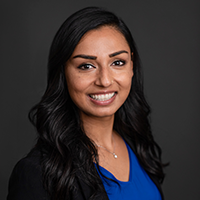
Tips from the Bench: Judge CJ Mody

Buchanan Ingersoll & Rooney
Judge CJ Mody, who joined the bench in January 2021, is the first South Asian American judge to sit on the San Diego Superior Court. Born in Bombay, India, now known as Mumbai, Judge Mody was 12 years old when he and his family immigrated to the United States. With aspirations to create educational opportunities for the children, Judge Mody’s family made the move to San Diego in the late 1980’s.
Noting that the ability to deal with adversity is invaluable, Judge Mody recalls that despite the hardships and struggles his parents faced in creating a new life in the United States, they always conducted themselves with dignity and openly discussed with Judge Mody and his brother the lessons and values his parents found important.
“Looking back now, realizing and appreciating what [my parents] went through really shaped my work ethic, my family values, and the way I approach my job and how seriously I take the responsibilities I have, both as a prosecutor and now as a judge,” said Judge Mody.
After graduating from the University of San Diego, Judge Mody worked as a teacher with the Juvenile Court and Community Schools, an alternative schooling program in San Diego for students who are homeless, incarcerated, or wards of the court, among other challenges. After teaching for a couple of years, Judge Mody returned to the University of San Diego for law school. Initially unsure of what type of law he wanted to practice, Judge Mody came upon an opportunity to work with the District Attorney’s Office, rather serendipitously, in the juvenile branch. He realized, “This is what I wanted to do for my career.”

Prior to joining the bench last year, Judge Mody spent 15 years at the San Diego District Attorney’s Office prosecuting domestic violence, child abuse, and elder abuse cases, which he regarded as “some of the most rewarding work I could do within the DA’s office.”
Advice for New Attorneys and Law Students
Drawing from his experience as an educator, mentor, attorney and now judge, Judge Mody has the following advice to impart on law students and new attorneys.
First, attorneys do not have to be aggressive or rude with one another to zealously represent their clients’ interests. Speaking from his experience on the bench, Judge Mody believes that being overly argumentative can be detrimental to your client because the effectiveness of an attorney’s position is often lost and the attorney can lose credibility. “It’s very hard to repair yourself after gaining a bad reputation among your peers,” he cautioned.
Second, Judge Mody emphasizes preparation: “I don’t think there’s anything you can do more to hurt yourself as an attorney, to hurt your client, than not being prepared.” He notes that when an attorney is not adequately prepared to address the facts of a case or certain legal issues that may be raised, everyone notices, including the client, opposing counsel, the jury, and, of course, the judge. This, in turn, also affects an attorney’s reputation.
Third, Judge Mody reminds attorneys to keep in mind that while they may be the ones walking into court, making arguments, and receiving the ultimate judgment or verdict, they did not get there alone. There is an entire support staff behind the scenes at law firms, public agencies like the District Attorney’s Office, and within the court that attorneys rely on. “We must treat each member of our team with the kindness and respect they deserve,” Judge Mody emphasizes.
Fourth, he advises young attorneys to get involved in the legal community, not just within their practice area, but also with attorneys in other fields and disciplines.
Lastly, Judge Mody spoke of how special the legal community is here in San Diego where there is strong camaraderie and willingness to help one another. Within this tight-knit community, reputation remains key — “Your reputation is very important in our legal community because it will follow you for the rest of your career.”